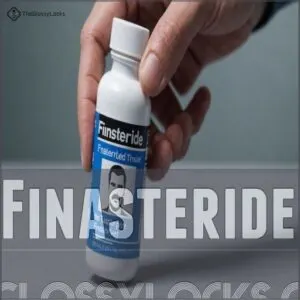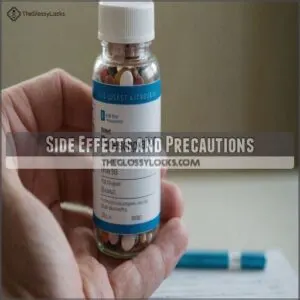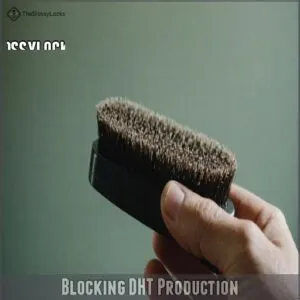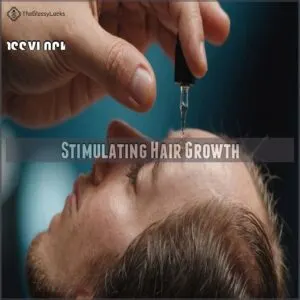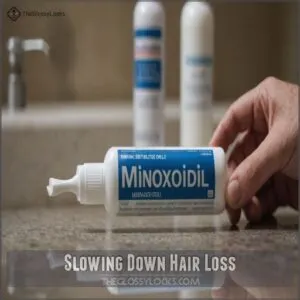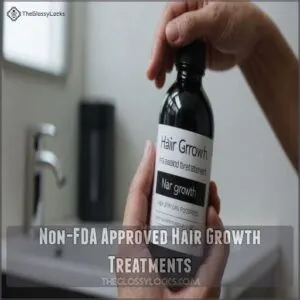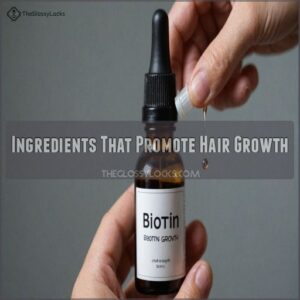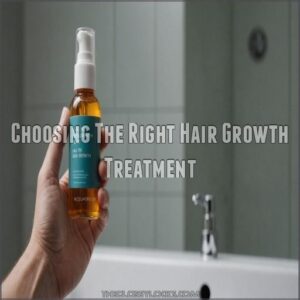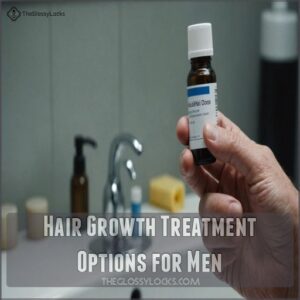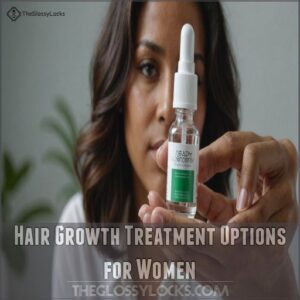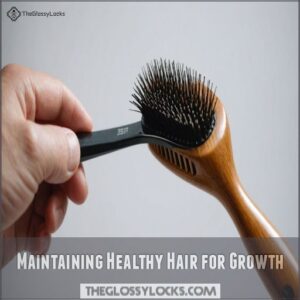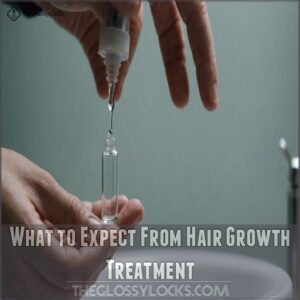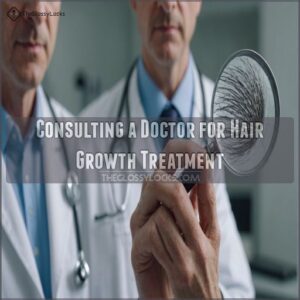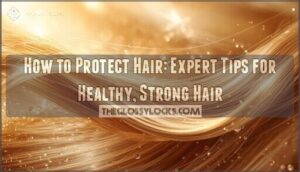This site is supported by our readers. We may earn a commission, at no cost to you, if you purchase through links.
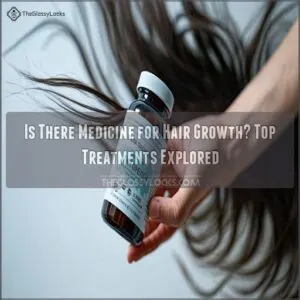
While it won’t bring back a receding hairline overnight, it does stimulate hair growth.
Scientists admit they’re not fully sure how it works, but hey, it does!
Then there’s Finasteride for men, helping block that pesky hormone DHT responsible for hair loss.
Both are FDA-approved, which means they’ve passed the "official" test for safety and effectiveness.
Stick around to learn more about what these can do and other surprising ways to help your hair grow strong.
Table Of Contents
- Key Takeaways
- FDA-Approved Hair Growth Medications
- How FDA-Approved Medications Work
- Non-FDA Approved Hair Growth Treatments
- Ingredients That Promote Hair Growth
- Choosing The Right Hair Growth Treatment
- Hair Growth Treatment Options for Men
- Hair Growth Treatment Options for Women
- Maintaining Healthy Hair for Growth
- What to Expect From Hair Growth Treatment
- Consulting a Doctor for Hair Growth Treatment
- Frequently Asked Questions (FAQs)
- What supplements are good for hair growth?
- What works best for hair growth quickly?
- Should you take hair growth supplements?
- What is a hair growth product?
- What are the best hair growth products?
- Can hair growth supplements help thinning hair?
- Do hair growth products work?
- Are hair growth products safe?
- What product is best for hair growth?
- Is there anything that really helps hair grow?
- Which medicine is best for hair growth?
- What medication promotes hair growth?
- Does hair growth medicine really work?
- Is there anything that really helps hair grow?
- Are there new hair growth treatments in development?
- Can stress impact hair growth treatment effectiveness?
- How long do hair growth medicine results last?
- Are there age limits for hair growth medicines?
- Can diet influence hair growth medication effectiveness?
- Conclusion
Key Takeaways
- You’ve got FDA-approved treatments like Minoxidil and Finasteride that effectively promote hair growth, but they require patience as results take months.
- Minoxidil is applied topically to stimulate hair follicles, while Finasteride is an oral medication that blocks DHT, a hormone responsible for hair loss.
- It’s crucial to consult with a doctor before starting any hair growth medication to understand potential side effects and the best option for your situation.
- Consistency and a balanced diet can boost the effectiveness of hair growth treatments, helping you achieve the best results.
FDA-Approved Hair Growth Medications
If you’re battling hair loss, two FDA-approved medications, minoxidil and finasteride, offer promising solutions.
These treatments work for many, though they come with their own set of side effects and need a bit of patience to see results.
Minoxidil
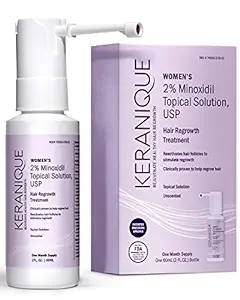
Ever tried rubbing magic on your scalp?
Well, Minoxidil isn’t magic, but it works wonders for hair loss.
Applied twice daily, it’s like watering thirsty roots, boosting growth for both men and women.
For women specifically, products like those found on Minoxidil for women can be especially effective.
Think of it as your hair’s personal trainer.
Of course, it’s not without side effects—some itching or dryness—but many swear by its effectiveness.
Finasteride
While minoxidil helps on the outside, finasteride works from within, tackling what’s beneath the surface of hair loss. It’s like having a tiny superhero pill that blocks DHT, the hormone behind male pattern baldness. With nearly 90% of users seeing slowed hair loss and regrowth, it’s a solid option for long-term use.
- Blocks DHT
- Taken daily
- Slows hair loss
- Supports regrowth
- Prescription needed
Side Effects and Precautions
Finasteride’s magic doesn’t come without strings. You might notice some hair regrowth, but keep an eye on the potential side effects. These include erectile dysfunction, depression, and allergic reactions. Remember, stopping the medication can reverse progress. Consider hair loss risks, medication interactions, and long-term effects before starting treatment. Keeping your locks under control requires diligence and awareness!
| Risk | Precaution | Impact |
|---|---|---|
| Erectile Dysfunction | Discuss with Doctor | Temporary |
| Depression | Monitor Mood | Emotional Health |
| Allergic Reactions | Test for Allergies | Skin Rash |
| Medication Interactions | Check Current Meds | Health Risks |
| Treatment Discontinuation | Plan with Professional | Hair Loss Reversal |
How FDA-Approved Medications Work
So, you want to know how those FDA-approved hair growth medications actually work?
Basically, they either block hormones that cause hair loss or help your hair follicles grow stronger, leading to thicker, fuller hair.
Blocking DHT Production
You’re curious about how hair growth medications work, right? They often tackle DHT, that pesky hormone linked to hair loss. By blocking DHT production, these treatments can help save those precious strands.
For topical solutions, you can find DHT blocker topical products online, such as Everysimply DHT blockers.
DHT blockers lower hormone levels
- Some natural remedies like ginger oil, which can fight dandruff and restore scalp balance, may also promote hair growth. Benefits include hair loss prevention
- DHT inhibitors come as pills or topical treatments
- Free your hair from falling
- Keep hair roots strong
Stimulating Hair Growth
Imagine your scalp as a garden.
For lush growth, fancy putting minoxidil on your plants.
It boosts blood flow—a little solar panel for your hair roots, energizing them to sprout.
Try visualizing those roots dancing as they drink in the goodness.
Finasteride, on the other hand, works by inhibiting the 5-alpha reductase enzyme.
It’s all about nurturing that hair growth cycle with some well-timed TLC.
Here’s a quick snapshot:
| Treatment | Method | Effectiveness |
|---|---|---|
| Minoxidil | Topical | High |
| Finasteride | Oral | Moderate to High |
| Biotin | Supplement | Moderate |
| Caffeine | Shampoo | Moderate |
| Oil Massage | Topical | Moderate |
Slowing Down Hair Loss
Hair loss can slow down with FDA-approved medications like minoxidil and finasteride.
These meds act like a protective barrier, reducing DHT production—a major hair-thinning culprit.
By blocking DHT, they halt further loss but also provide a chance for regrowth.
Pay attention to your lifestyle choices—stress, diet, and genetics all play a part.
Non-FDA Approved Hair Growth Treatments
You’ve probably heard about shampoos, supplements, and laser devices that promise to promote hair growth, but they’re not all FDA-approved.
These treatments might leave you feeling like you’re on a wild goose chase, as their effectiveness often varies and depends heavily on individual hair types and conditions.
Shampoos and Scrubs
Choosing the right shampoo can make your hair feel as if it’s getting the TLC it deserves.
Look for natural ingredients that boost scalp health, like tea tree oil.
Some scrubs work wonders by – cleansing roots
- Removing product buildup
- Preventing hair damage
Check product reviews to make sure they fit your hair care routine, keeping it smooth and shiny.
Supplements and Vitamins
After considering shampoos and scrubs, let’s chat supplements.
Biotin is a crucial vitamin for hair health, and its deficiency can lead to thinning hair or hair loss. Biotin benefits your hair’s health, making it shinier and thicker.
Hair loss vitamins, like zinc and iron, tackle deficiencies linked to thinning.
Research supplements that help support hair growth.
Choosing the best supplements can feel empowering, handing you the reins in handling your hair’s destiny without too much stress.
Laser Devices
Many gadgets promise hair regrowth, but let’s talk laser devices.
These tools, like combs or caps, use low-level lasers.
The idea? Stimulate follicles for hair regrowth.
However, scientific evidence supporting this claim is still thin.
Before you buy, weigh the cost effectiveness and user experience against the lack of strong proof.
Always prioritize safety and talk to a dermatologist.
Ingredients That Promote Hair Growth
In terms of promoting hair growth, certain ingredients like biotin, zinc, and iron can make a real difference and may even help address specific deficiencies.
You’ve probably heard of saw palmetto and ginseng, too, which are popular for their potential to block hair-thinning hormones, while rosemary essential oil is gaining attention for its scalp-stimulating properties.
Biotin and Vitamin Deficiencies
Using natural ingredients in shampoos and scrubs can be great, but don’t overlook the power of vitamins.
Ever noticed your hair thinning? Biotin deficiency symptoms might be the culprit. Biotin supplements are your hair’s best friend here, giving it a fighting chance.
Hair growth rate is influenced by genetics, and a person’s hair is the second fastest-growing tissue in the body, after bone marrow learn more about hair growth. Vitamin D deficiency can also stir trouble, so be sure to address nutritional deficiencies for hair loss prevention.
Zinc and Iron Supplements
Just like biotin, zinc and iron play key roles in combating hair loss.
If you suspect a deficiency, consider talking to your doctor about supplements.
Here’s a quick rundown:
- Zinc boosts your scalp health.
- Iron improves blood flow to follicles.
- Dosage differs for each mineral.
- Too much can harm as well.
Spot deficiencies, and you’re already halfway there!
Saw Palmetto and Ginseng
So you’re thinking about boosting hair growth?
Saw palmetto and ginseng might be your pals.
Saw palmetto is known as a potential DHT blocker, while ginseng is believed to energize your scalp and follicles.
Both can be found in hair health products and supplements.
Remember, though, always check the safety concerns before trying any new treatments.
Rosemary Essential Oil
After exploring saw palmetto and ginseng, consider incorporating scalp stimulating oils like jojoba or argan oil to nourish hair and promote growth, and then consider rosemary essential oil for hair growth.
This aromatic oil is your hair’s new best friend.
Research suggests it could boost growth by improving circulation in the scalp.
Plus, using rosemary oil can tackle dandruff while leaving your hair smelling like a herb garden.
Keep it in your hair care toolkit for natural support!
Choosing The Right Hair Growth Treatment
Picking the right hair growth treatment can feel like searching for a needle in a haystack, but don’t worry!
Consider your hair type and the reason for your hair loss.
Always check the ingredients before you buy, and if you’re unsure, chat with a dermatologist for personalized advice.
Considering Hair Type and Loss Causes
Choosing hair growth treatments can be like finding the perfect shoe: it’s all about fit.
Your hair type dictates how treatments work, while understanding hair loss causes, including causes like androgenetic alopecia, makes sure you choose wisely.
Explore options that match your situation, considering lifestyle factors for a personalized approach.
Remember, selecting the right path is key to regaining control and confidence.
Evaluating Product Effectiveness
Checking product effectiveness for hair growth can feel like a science experiment.
Focus on research-backed ingredients and clinical trials that showcase real results.
Don’t skip customer reviews—they’re like cheat sheets for this hair quest.
Finally, look for evidence of positive outcomes in the fine print.
With these steps, you’ll sift through the noise with ease.
- Research: Study clinical results.
- Ingredients: Check their efficacy.
- Reviews: Read user experiences.
Consulting a Doctor or Dermatologist
Seeing a doctor is key for tackling hair loss.
They’ll help diagnose the root causes and guide you through treatment options like medications or preventative measures to avoid scalp irritation such as preventing itchy scalp. They’ll help diagnose the root causes and guide you through treatment options like medications or hair care tips.
You might discuss potential side effects of treatments or schedule follow-up appointments to track progress.
Think of them as your hair’s personal trainer, helping you achieve freedom from unwanted loss.
Hair Growth Treatment Options for Men
If you’re a man noticing more hair in the shower drain than on your head, you might be wondering about treatment options.
From minoxidil and finasteride to laser devices, exploring these solutions could be the first step to reclaiming your mane.
Reclaiming your mane without breaking the bank.
Minoxidil and Finasteride for Male Pattern Baldness
Discovering the right hair growth solution can feel like finding a needle in a haystack. Minoxidil and Finasteride are your go-to medicines for tackling male pattern baldness.
You can even purchase Minoxidil online for convenient application at home Buy Minoxidil here.
- Minoxidil is a topical treatment boosting hair follicles. – Finasteride reduces DHT to slow hair loss. – Beware of side effects like dizziness.
- Consider combination therapy for best results.
Low-Level Laser Therapy (LLLT) Devices
You might’ve tried Minoxidil and Finasteride already, but curious about the laser path? Low-Level Laser Therapy (LLLT) devices offer a glowing promise for hair growth. They’re generally safe but remember, effectiveness varies. Before rushing to buy, think about the costs and research ahead, particularly the FDA-cleared devices like Illumiflow and Kiierr, which can boost hair density by up to 20% best laser cap options.
| LLLT Aspect | Description | Things to Think About |
|---|---|---|
| Safety | Generally safe | Consult with a doctor |
| Effectiveness | Results vary | Manage expectations |
| Cost | Can be pricey | Compare with alternatives |
| Alternatives | Medications, oils | Pros and cons |
| Research | Ongoing studies | Keep updated |
Hair Growth Treatment Options for Women
Dealing with thinning hair can be frustrating, but you’re not alone! Let’s explore effective hair growth treatments specifically designed for women, including FDA-approved options and other promising approaches.
Minoxidil for Female Pattern Hair Loss
While minoxidil’s a game-changer for many dealing with female pattern hair loss, its success isn’t guaranteed for everyone.
Applying it twice daily can boost its effectiveness, like a morning coffee routine but for your scalp.
Keep an eye out for side effects like irritation.
If results aren’t visible in months, consider other options.
Remember, persistence might pay off eventually!
Hormonal Treatments
After exploring Minoxidil, it’s time to chat about hormones.
Hair loss in women often dances with hormonal imbalances, leading many to try estrogen replacement therapy.
This boosts hair density but beware of hormone therapy risks.
If androgenic alopecia‘s the culprit, treating the imbalance might be key.
Always consult a doc before hopping on the hormone train!
Maintaining Healthy Hair for Growth
To promote hair growth, maintaining healthy hair is essential.
By focusing on a balanced diet, reducing stress, and using proper hair care techniques, you’ll keep your locks strong and shiny, minimizing the need to blame your hairbrush for that pile of strands.
Balanced Diet and Nutrition
Nourishing your hair starts with what you eat.
Think of your plate as the first line of defense against hair loss.
Load up on protein-rich foods like eggs and beans to support growth.
Keep vitamin deficiencies at bay with leafy greens and fruits.
Don’t fall for quick fixes; balanced meals and nutritional supplements are your hair’s best friends.
Reducing Stress and Anxiety
Reducing stress and anxiety is like giving your hair a spa day.
Stress management techniques can work wonders.
Here’s a handy list to get you started:
- Try deep breathing exercises to calm your mind and roots.
- Embrace yoga and meditation for balance and peace.
- Incorporate mindfulness practices throughout your day for holistic relaxation.
Proper Hair Care and Styling
In hair care, no one-size-fits-all approach works as it’s essential to tailor your routine for healthy growth.
Balancing between the right hair washing routine and styling products can make a difference.
Consider these tips:
| Tips | Benefits |
|---|---|
| Gentle Brushing | Enhances scalp health |
| Moderate Washing | Prevents hair damage |
| Minimal Heat Styling | Reduces stress on hair fibers |
| Product Choice | Protects and nourishes hair |
Protecting Hair From Damage
Proper hair care goes hand-in-hand with protecting it.
Limit heat styling, as it can weaken hair and lead to heat damage issues, such as dryness and brittleness.
Think twice before using harsh hair coloring or chemical treatments.
Sun protection‘s important, too; a hat can be your best friend.
Keeping your scalp healthy is key.
All these steps can make a big difference in your hair’s overall health and growth.
What to Expect From Hair Growth Treatment
When you start a hair growth treatment, you can expect to see noticeable results after several months, as the process is gradual and requires patience.
It’s important to understand the effectiveness and success rates vary, and while side effects are usually mild, they’re something to keep in mind.
Timeframe for Results
Consistency in maintaining healthy hair habits demands patience for noticeable results.
Regarding hair growth treatments, think of watching grass grow—slow but steady wins the race.
Typically, you can expect to see initial improvement within three to six months, so set realistic goals.
Remember, hair doesn’t follow a Netflix binge timeline; it’s all about gradual progress and expectations.
Effectiveness and Success Rates
While waiting for hair growth results can feel like watching paint dry, knowing what’s typical helps manage expectations.
Long-Term Results are shown with minoxidil and finasteride, but success varies per individual.
Hair type and user reviews highlight this variation; what works wonders for one might just slightly boost another’s growth.
Keep this in mind, and embrace whatever positive changes occur!
Potential Side Effects and Risks
Hair growth treatments can work wonders, but it’s not all sunshine and rainbows.
Medication side effects like allergic reactions, lingering DHT blocker risks, and potential long-term effects might catch you off guard.
Additionally, as supplements like biotin for hair growth may interact with other medications, imagine treating hair loss but feeling queasy.
Be sure to chat with your doctor, ensuring you’re aware of any potential hair loss risks before you start.
Consulting a Doctor for Hair Growth Treatment
You might feel like Sherlock Holmes when trying to solve the mystery of hair loss, but sometimes it’s best to call in the experts.
Consulting a doctor can help pinpoint the root cause and pick the right treatments to get your hair back on track, saving both time and potential follicle frustration.
Determining The Cause of Hair Loss
Before jumping into treatments, figuring out why your hair’s thinning is key.
Let’s face it, it could be your genetics taking the wheel, that new stress-filled job, your carb-heavy diet, or just some medications reacting.
Teaming up with a doc will help narrow it down. They’ll look into your medical history and craft a clearer plan.
Discussing Treatment Options
Your doctor will discuss your options, weighing the pros and cons of each.
Topical treatments, like minoxidil, are applied directly to your scalp, while oral medications, such as finasteride, are pills.
Natural remedies exist, but their effectiveness varies.
We’ll compare costs, potential side effects, and long-term solutions to find the best fit for you.
Remember, everyone’s journey is unique.
Monitoring Progress and Adjusting Treatment
Checking in with your doctor keeps you on track with hair growth timelines and treatment effectiveness.
Imagine it like fine-tuning a guitar—small tweaks can make a big difference.
Watch for side effect management and consider dosage adjustments to hit the right notes.
Success rate variation demands attention, so stay connected with your doctor to adjust your approach when needed.
Frequently Asked Questions (FAQs)
What supplements are good for hair growth?
Supplements like biotin, zinc, and iron can support hair growth, especially if you’re deficient.
Collagen and saw palmetto may also help by strengthening strands and reducing DHT levels.
Always consult a doctor before starting new supplements.
What works best for hair growth quickly?
Finding a quick fix for hair growth feels like chasing rainbows, but minoxidil and finasteride show promise.
They often take months to work, but they’re your best bet.
Pair them with gentle care for best results.
Should you take hair growth supplements?
If you’re dealing with hair loss, hair growth supplements can support healthy hair, especially if you’re deficient in nutrients like biotin or zinc.
They’re not magic fixes, though, so manage expectations and consult with a healthcare professional.
What is a hair growth product?
Some hair growth products, such as those containing onion juice rich in sulfur, may boost hair growth. Hair growth products aim to boost hair growth or improve hair health. They range from shampoos and serums to pills and topical treatments. Many claim to help, but results vary.
What are the best hair growth products?
Check out Minoxidil and Finasteride, the only FDA-approved hair regrowth treatments.
Add a mix of biotin-rich supplements, gentle shampoos, and lightweight serums to boost your hair’s shine and thickness.
Remember, consistency is key!
Can hair growth supplements help thinning hair?
Supplements like biotin, zinc, and iron can support hair health if deficiencies exist.
Though they mightn’t directly trigger hair growth, they’re beneficial if your body lacks essential nutrients necessary for maintaining healthy hair.
Do hair growth products work?
Yes, hair growth products can work, but it depends on the ingredients.
Look for clinically proven ones like minoxidil and finasteride.
While some people see regrowth, you’ll need patience as results often take months to appear.
Are hair growth products safe?
Hair growth products can be safe if you choose reputable brands and check for FDA-approved ingredients like minoxidil.
Always read labels, follow instructions, and consult a doctor for advice, especially if you have sensitive skin.
What product is best for hair growth?
Did you know that about two-thirds of men see results with minoxidil?
It’s a top choice for hair growth.
Alongside finasteride, they’re FDA-approved, offering effective regrowth strategies.
Just remember, consistency is key to success!
Is there anything that really helps hair grow?
You can try minoxidil and finasteride for effective hair regrowth.
Minoxidil is topical, while finasteride is a pill.
They work well for many but require patience, as results take months.
Consider these under a doctor’s guidance.
Which medicine is best for hair growth?
Want thicker locks?
Minoxidil and finasteride are FDA-approved, but talk to your doctor first.
They can help you choose the best option for your unique situation, and discuss potential side effects.
What medication promotes hair growth?
Minoxidil and finasteride are effective medications for hair growth.
Minoxidil stimulates hair follicles when applied to the scalp.
Finasteride blocks DHT, a hormone related to hair loss.
Consult your doctor for the best option.
Does hair growth medicine really work?
Yes, hair growth medicines like minoxidil and finasteride do work for many people, slowing hair loss and promoting regrowth.
Results can vary, so it’s about finding what suits you and having a bit of patience.
Is there anything that really helps hair grow?
If you’ve ever felt like your hair needs a superhero, you’re in luck!
Minoxidil and finasteride are the dynamic duo proven to boost growth.
Both require consistent use and patience, but they’ve helped many reclaim their locks.
Are there new hair growth treatments in development?
Researchers are exploring innovative treatments for hair growth, including stem cell therapy and PRP (platelet-rich plasma) injections.
These methods aim to stimulate hair follicles naturally.
While promising, they’re still in development and not widely available yet.
Can stress impact hair growth treatment effectiveness?
Stress can definitely throw a wrench into your hair growth plan.
It can slow or even negate treatment effectiveness by causing shedding and derailing growth cycles.
Reducing stress is key to maximizing the benefits of any treatment.
How long do hair growth medicine results last?
Think of hair growth meds like planting seeds; their results last as long as you keep using them.
Stop, and your progress may slowly fade, usually within a few months.
Consistency is key for sustained results.
Are there age limits for hair growth medicines?
No, there aren’t strict age limits for most hair growth meds.
However, doctors often consider your overall health and specific needs when prescribing them, so it’s always best to chat with your doctor first.
Can diet influence hair growth medication effectiveness?
Picture a balanced diet like the fuel for your car—it can optimize your hair growth medications.
Nutrients like biotin, zinc, and iron support these treatments, ensuring they work more effectively.
So, eat healthily and watch the magic happen!
Conclusion
Think of hair growth treatments as a gardener tending seedlings; patience and care are key.
You’ve got options like Minoxidil and Finasteride, both proven for stimulating growth, but remember consistency is essential.
Don’t shy away from exploring supplements or lifestyle changes to bolster your efforts.
Understanding what works for you and consulting with a professional can make a big difference.
So, if you’re asking, "Is there medicine for hair growth?" the answer is a cautious yes, with time and commitment.

